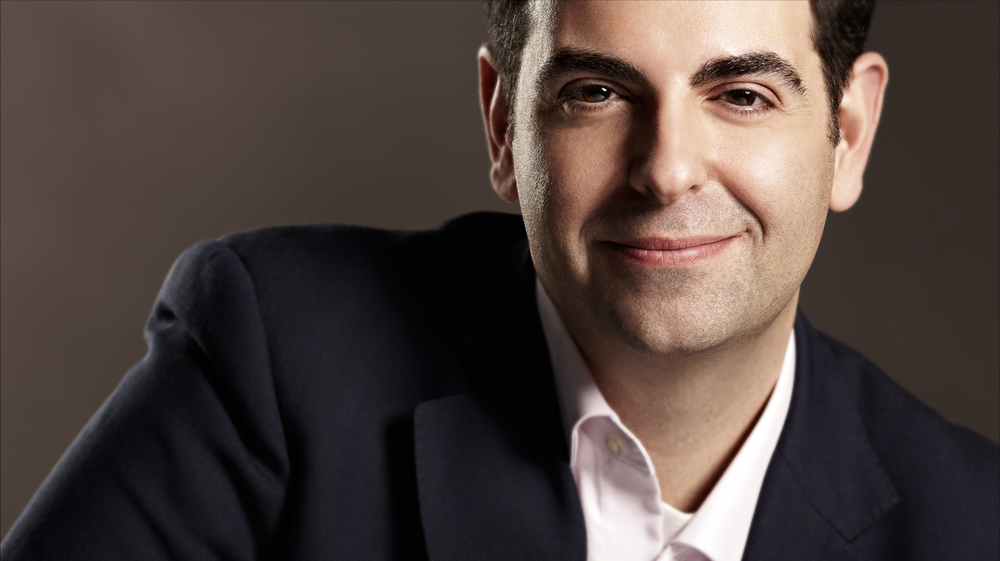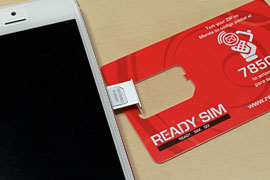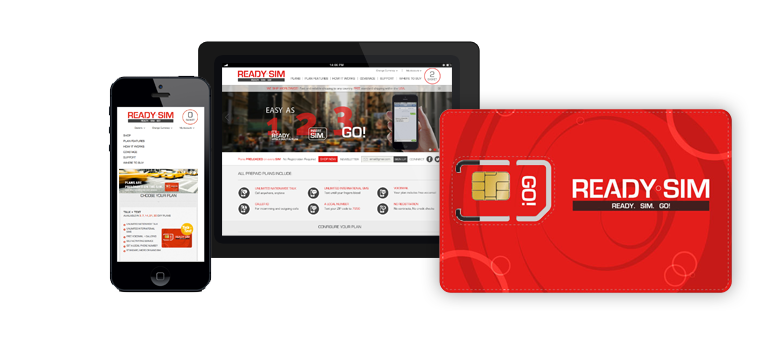Innovating Telecom – Emir Aboulhosn (CEO) of Ready SIM
“Ready SIM is the James Bond of SIM cards. If you need to keep calls, texts and emails confidential, than this is the product for you. No personal information is needed to activate, therefore, calls cannot be traced to a specific name or organization in any way. After use, you can dispose of the SIM card and the information it contains.”
It’s a compelling thought – especially when you consider the alternative: 2 year contracts, overage charges, hours of dealing with customer service reps. Ready SIM’s scenario instantly recalled memories of Inspector Gadget’s exploding messages (the cartoon of course, not the terrible live action rehash starring Matthew Broderick *shudders*). But I digress.
Here’s a deeply insightful narrative interview with Ready SIM’s CEO, Emir Aboulhosn
We talk about the telecom industry, the growing need for consumer choices, and his thoughts on what makes the perfect team. Enjoy!
Click here for more info on Ready SIM.
Introductions and Inspiration
The initial company, Roam Mobility Service came to market in January 2012. It offered the first product with roaming replacement services for travelers between Canada and the United States. Considering the size of the addressable market (60M visiting the US, 20M Canada), their goal was to create products that allowed every Canadian entering the US to forget about roaming fees.
Roam Mobility had the benefits of being first to market and being unique in their space. But they wanted to build more services around this idea. Here are some additional discussion points that lead to Ready SIM:
- They figured out how to do a self-activating SIM + wireless product
- The goal was to remove retailer assistance out of the product
- It should be as easy as stepping off a plane, popping in a card, start calling/texting/browsing with a quick 5-digit zip + baked in plan
The idea behind all of this stemmed from where Emir saw a growing need in the telecom space for short term service that focuses on a per-needed basis; “commoditizing wireless,” – as he puts it.
“Our goal is to commoditize wireless. Sell it as needed and remove the need for long term contracts. It’s precisely why carriers aren’t as interested in this field as they should be. Their main goal is to create a long-term sustainable customer base. With this, we had an opportunity to create a competitively priced product for the US market with a simple model.”
Emir’s Take On Wireless
“We have a very different take on wireless in general. The introduction of smart phones has made us (as consumers) more data centric. Eventually, I see picking wireless service like how you choose the gasoline for your car. It’s an analogy I constantly use because it’s easily relatable to most people.
Say you’re using any number of Android devices, an iPhone, whatever. Assuming connectivity and pricing are equal, there’s really no difference in the service you pick. Your phone is still the same, but all you know about your carrier is the little logo next to your wireless indicator. It’s like if you’re driving a Ford, GM, etc. – whether you fill up at Shell or Chevron, your car will run identically.”
With this model, they want to empower consumers. Phone numbers would be parked in the cloud and the only ‘resource’ a customer would need is data.
Emir envisions a world where as soon as you have connectivity, you pick any carrier (assuming they fit your need and price point). What’s eliminated is the long and arduous process of going into a mobile retailer, picking the “perfect” plan, and going through multiple steps to commit to it.
“At the end of the day, consumers will be the only winners and prices will be lower overall across the board.”
So Why Has the US Been So Slow to Adapt?
Emir’s thoughts on the matter:
“I do believe carriers are worried this will pick up. T-Mobile is well ahead of the game, branding themselves with the “uncarrier” model. I do think AT&T and Verizon might be right around the corner with LTE services but overall, we need to take a look at how the market operates.
Most of these big US companies are public to begin with – it’s critical to consider they live and die by their average revenue per user (ARPU). As public companies, they have to answer to shareholders and follow the market. That’s why they’re doing everything in their power to fight a lowering of the ARPU.
They do this by getting a customer locked in on a long term contract and not worrying beyond that.”
Emir believes the ‘danger’ for these big mobile companies comes when customers figure out that swapping is easy and in their favor.
On why the market has been so slow to adopt? He believes that no one wants to be the first to go.
The disruption would occur in the mobile broadband space – if network connectivity is equal across the board, you (the carrier) will have to hold on to your customers by price. So when one carrier goes down this route, they’re going to take everyone down with them.
The International Market
Emir gives us a snapshot of how things are like for our neighbors across the Atlantic and Pacific.
In Europe and Asia, there’s a huge over saturation of wireless. The dynamics are considerably different and SIM card-based businesses have been around for over a decade. Emir reminds us that unlocked phones have been the norm for the rest of the world – but are now a rising trend in the US.
“It’s a matter of adoption, but it’s definitely coming. In 4-5 years, the world will be very different.” Says Emir.
The Man Behind Mobile
Emir takes some time to share with us his own personal background.
“To be honest, when I started Roam Mobility, it was my first attempt at the telecom industry.”
What? He chuckles as he explains.
“Originally, I was in software development – not as a programmer, but designing and planning with a strong marketing background. I knew that telecom was where my next venture would be. I loved the business model and dynamics; fast paced, with a great environment for competition – but most importantly, I saw it as a place that had a lot of room for change.
To Emir, Roam Mobility and Ready SIM had the key elements for a successful startup:
1) Being disruptive
2) Being able to solve pain points
In Ready SIM’s case, the technology came before the problem, which was pretty unique. All they had to do was find the problem and deliver the right solution.
Emir’s goal? Focus on unwinding the overly complicated process to become a mobile customer. With Ready SIM, you walk into their retailer, purchase a 14 day SIM card, pop it in, and you’re good to go. He refers back to his gasoline analogy to frame how “easy” he wants to see the process – no need to engage with customers except for troubleshooting, no names, personal info, or credit checks.
Fighting Fear
After Emir tells me about their full FCC compliancy, immediately, my thoughts turn to a new question.
What if big carriers get ahold of these ideas and offer their own counter-products, or (even worse), chase after legislation to stifle competition (and innovation)?
Emir’s thoughts:
“Trust me – it crosses your mind, you hear comments, and people look and evaluate your business with assumptions. Some of them have merit, and some of them don’t. But I believe if you focus too much on what people are saying or thinking, you stop looking forward.
It’s exciting. We have no idea what’s going to happen, but we know there’s going to be new options placed before us eventually – and we’ll have to choose what direction to go in as an organization, but in the meantime, the system is so well established as a business model, for us to be disruptive enough to start unwinding that system would be a significantly different experience.”
Their focus is to keep selling and innovating and see what opportunities come out of it. It’s the age-old startup mentality: continue talking to customers and engage them for feedback, continue improving the product, and keep looking forward instead of being held back by whispers.
How Does Ready SIM Reach Customers?
Emir talks about the difficulties of tackling the Canadian market. What they offered was so radically new and different that they needed to establish a strong retail presence across the country and back it up with customer service and experience. Their goal in doing so was showing the market they were the right alternative.
And their biggest driving factor? Good old fashioned word-of-mouth. People use the product, have a great experience, then tell their friends. A personal anecdote from Emir:
“We’re getting to a point where our customer base is driving itself. We want to raise the level of awareness a little more – it’s a great feeling when you travel across the country, and you know someone who knows someone who used it.”
As they’re no longer the product that no one has heard about, Ready SIM’s goal in the coming year is to engage discussion with an aggressive approach. And how are they doing this?
Focus On Distribution
Ready SIM’s international side of things: after working within the travel-side well enough, they know that people want the card in their hands before coming to the US for business. By that token, resources will be put into distribution centers (Germany for the EU) with locations in Asia and Australia as well.
With the US, they’re working on a different approach by contacting all kinds of retailers – big box to small, with some notable progress planned for 2014.
“The nice thing about Ready SIM is because we’ve eliminated the dealer assistance model, we can sell to anyone through any avenue. Convenience stores, gas stations, home businesses, selling Ready SIM requires little to no set up. It’d be as easy as selling a pack of gum.”
Let’s Go Back – What Got Emir into Technology?
Emir reports that he has always been a techie. Gear, gadgets, automotive, etc. He loves everything about it and the effect it has had on the human race. His insights:
“In the last 100 years we’ve seen more changes than in the last 2000. All because of technology. I fell in love with the idea and started realizing it’s a change for good. You can approach any type of industry problem and find a technological solution for it.
I don’t want to get too off course with philosophy, but I believe everything can be improved, and with it comes opportunities -> business models -> and the execution behind it.”
Emir relates it back to his own experience with telecom.
“With telecom, honestly, nothing’s changed in the last 25 years. You choose your carrier, purchase their long-term service; it’s almost the same process as purchasing a cable service 20 years ago where someone comes by your house to install the box.”
Emir reminds us that he’s not even old enough to have bought cable service 20 years ago, thereby re-iterating how outdated these industry models seem.
And with this came Emir’s fixation on the wireless industry. He saw the stagnation of the telecom industry and has been thrilled to introduce a new way for people to buy wireless. He reminds me that he’s a consumer, just like every one of his customers.
“I’m a consumer, no different than everyone else. I do feel fortunate though that I’m in a place that I can execute some of these changes and make them happen.”
Passion for Your Craft
Emir emphasizes teamwork and gives credit to the great team he works with. In a company whose MO is to innovate telecom, a great team is important to stay focused on creating greater impacts overall.
And what makes a good team member?
“Passion. Passion for what you do. It’s incredibly powerful – it will blind you to the point where you can ignore all the disruptions and focus on achieving a goal. And if you have enough of it, it’ll rub off on others and empower those around you.
Passion keeps you from being short-sighted so you can make decisions, allow you to be forgiving, and be progressive.
You can have people who are having difficulties working around a problem, but if they have the same passion, you can find common bonds. It’s a type of energy that you can tell when you walk into a room. A personal characteristic that really manifests itself.”
Emir takes a moment to remind us about other major companies like Apple and Google – wildly successful companies. The key trait here? People who are incredibly passionate about what they’re doing. To him – when companies become mundane and repetitive is when they get in trouble.
And through this conversation, I learned just why Ready SIM has done so well – with a passionate CEO, Emir Aboulhosn at the helm.














